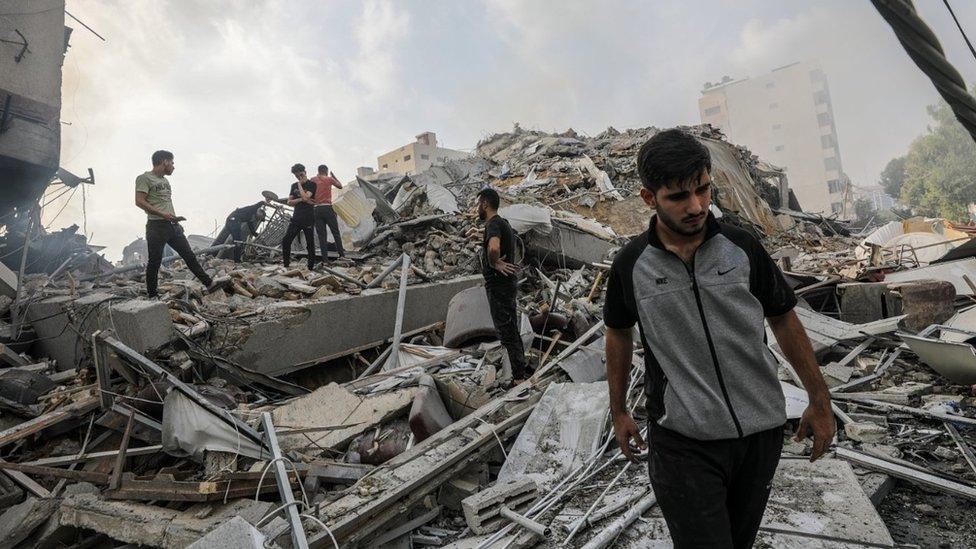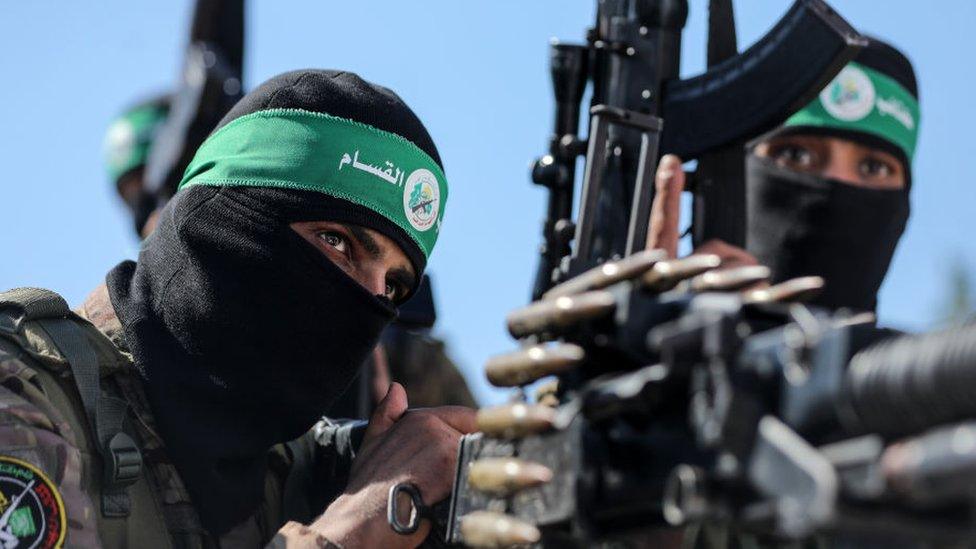Gaza: Children screamed in street as we fled 2am air strike
- Published
Watch: Hiding at home, blinded and choked by dust - a video diary from Gaza
Gaza's only power plant has run out of fuel, and medical and food supplies are dwindling, after another night which saw hundreds scramble onto the streets to flee relentless air strikes.
At 02:00 on Wednesday, a neighbour banged on my door and told me to leave now as my flat was being targeted.
Air strikes from Israeli warplanes have continued into their fifth day.
The situation for 2.3 million people in Gaza is increasingly desperate, with no way of leaving the tiny territory.
The only power station in Gaza stopped operating completely on Wednesday at 14:00 local time (11:00 GMT), authorities say.
Israel cut essential supplies, including fuel, to the sealed-off territory on Monday following a violent incursion by Hamas militants.
The lack of mains power means residents of Gaza have to rely on generators for electricity. But there is no way to import fuel for generators either.
There is now little hope of leaving the territory, after Israeli crossings were shut and Egypt was forced to close its only crossing point with Gaza due to nearby air strikes.
I tried to get my family out, because it is unclear what might happen here in the future - but that was impossible.
In the early hours of Tuesday morning, I woke up my three children, we grabbed our emergency kit and headed to the hospital.
But when we got there, hundreds of people were blocking the entrance - they too were looking for a place to shelter overnight.
Half-asleep children screamed as they stumbled through the streets with rockets flying overhead.
On Wednesday morning, Hamas said 30 people were killed in overnight strikes. In total, more than 1,000 Gazans have died in the retaliatory air strikes.
Israel's military said they had hit 450 targets in the Gaza strip in the past 24 hours.
The air strikes began after Hamas militants crossed into Israel and launched a wave of attacks on communities across the south of the country, killing at least 1,200 Israelis. An estimated 150 people have been taken hostage by Hamas.

More on Israel Gaza war
Follow live: Latest updates
Hostages: Who are the people taken from Israel?
Bowen: Inside Israeli border village where Hamas killed families in their homes
History behind the story: The Israel-Palestinian conflict

Israel declared a "complete siege" on Gaza on Monday, declaring electricity, food, fuel and water would be cut off. The impacts of that siege can now be seen.
On Tuesday, I met a woman in a supermarket scouring the shelves looking for milk for her baby. She only had half a bottle left, but the supermarket was bare.
About 80% of people in Gaza relied on humanitarian aid even before the latest war began - and the UN agency for Palestinian refugees said at least a million people had not been able to get their food rations since Saturday., external
The World Health Organisation has called for a humanitarian corridor to be opened into the territory. But here, civilians don't hold out hope that will happen.
A leading British-Palestinian doctor, Dr Ghassan Abu-Sittah, told the BBC the health system in Gaza would collapse within a week unless aid was allowed.
"All of the beds are full. Patients who need surgery are unable to go into surgery because the operating rooms are operating at maximum capacity," he said, adding that this was the bloodiest assault he had seen since he started working in Gaza over 40 years ago.
"Because people are being injured in their homes, around 30-40% of the injuries are children. Whole families are being brought in wounded... In war you try to discharge cases early so you can free up beds, but these patients are all coming from houses that have been destroyed and so you cannot send them back to the street," he said.
Watch: Driving through Gaza's streets
Hamas's leader said he would not negotiate prisoner swaps for food and medicine, and he would not negotiate with Israel while the territory was under fire.
The UN human rights chief has said sieges are illegal under international law. UN agencies have also condemned the mass killings by Hamas and called on them to release the hostages they have taken.
And while Israel insists it is not targeting the civilian population in Gaza, the people here feel a decision to cut water, food, medical and electrical supplies to 2.3 million people is a collective punishment.
People in Gaza know what war looks like, but this one feels different.

Are you personally affected by the issues raised in this story? If it is safe to do so, please get in touch by emailing haveyoursay@bbc.co.uk, external.
Please include a contact number if you are willing to speak to a BBC journalist. You can also get in touch in the following ways:
WhatsApp: +44 7756 165803
Tweet: @BBC_HaveYourSay, external
Please read our terms & conditions and privacy policy
If you are reading this page and can't see the form you will need to visit the mobile version of the BBC website to submit your question or comment or you can email us at HaveYourSay@bbc.co.uk, external. Please include your name, age and location with any submission.

- Published9 October 2023

- Published11 October 2023

